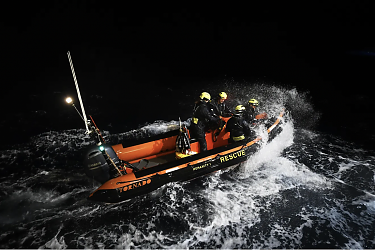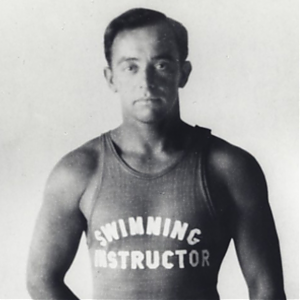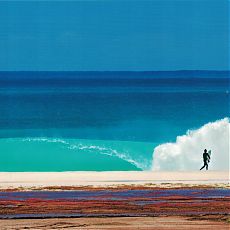How to Film Nazis
… and how not to
February 2010
The big surprise last week during the Berlin Film Festival was a disastrous premiere for a long-awaited feature film, Jud Süß — Rise and Fall, by a talented German director named Oskar Roehler. The film took liberties with an otherwise true story from the Nazi era and ended its world premiere to a chorus of boos.
It was a strange baptism. As pure moviemaking, the film isn’t bad. Another film that takes even more outrageous liberties with Nazi history, moreover — Inglourious Basterds, by Quentin Tarantino — has been praised far and wide by German critics. The main difference appears to be that one film has an American director, while the other is German.
Inglourious Basterds deals with an utterly fictional band of American soldiers who set out to collect Nazi scalps. (Never happened.) Jud Süß — Rise and Fall is about an Austrian actor who won fame in Europe by playing the lead Jewish role in the most notorious work of anti-Semitic filmmaking under Hitler, a melodrama called Jud Süß. (Did happen, though not quite the way Roehler tells it.)
Both films would qualify as revisionism, given an audience with a weak historical grasp of the Nazi era. The average American 12-year-old will have a warped impression of World War II after Inglourious Basterds, but to most adults it’s so obvious that Tarantino is joking that the movie’s lurid comic-book style forgives it.
The same should apply to Jud Süß — Rise and Fall. Roehler has written a deliberate melodrama, and he took liberties with history that belong to the form. It shows Ferdinand Marian, the Austrian actor who takes the lead role in Joseph Goebbels’ pet film, married to a woman who’s one-quarter Jewish. This device heightens the tension at home for Marian as he tries to pursue an acting career in the Third Reich. Nazis deport her by the end of the film.
Marian’s real wife, though, was neither Jewish nor deported. “It is complete rubbish,” a biographer of Marian, Friedrich Knilli, has said. “You can’t simply falsify the facts in historical films. One has to stick to the truth a bit.”
This is precisely the attitude that has started to change.
The original Jud Süß was a smash hit in 1940. A German director with Goebbels’ enthusiastic blessing re-worked Lion Feuchtwanger’s novel about Joseph Süss Oppenheimer, a Jewish financial adviser to the Duke of Wittemberg. Süss was hanged in 1738, and Feuchtwanger’s 1925 novel re-tells the story to warn against hysteria and anti-Semitism. The Nazi film twists the novel to fuel both. It was so notorious that the American military banned it in Germany after 1945; in fact showing the film is still illegal here.
So the true story of a liberal-minded Austrian actor, with bohemian and Jewish friends, who sells himself to the Nazi machine but delivers a nuanced, unstereotyped performance as Jud Süss (as Marian did in real life, hoping it would help) works as a Faustian tale.
Berliners booed last week for a number of reasons. Scenes from the original, banned Jud Süß were re-created in the new film; even seeing them on a screen is taboo. Audiences were also ready for some historical inaccuracies discussed in the press. Worst of all, the movie treads on German memories of the war in a weird melodramatic mode, and sometimes turns (deliberately) to tasteless kitsch. The subtitle in German, “Film Without Conscience,” indicates the director’s intent. It lacks the sober tension of recent German war movies like Downfall. But it’s a good melodrama, just as Inglourious Basterds is a good comic-book thriller.
So the question is: Should it be? An era of fanciful filmmaking about Nazis has dawned just as the last Holocaust survivors die out. Scruples about historical facts have loosened as human memories start to fade. German moviegoers don’t mind so much if an American writes an over-the-top Nazi satire, but can a German artist tell fibs to other Germans about the Nazi era, even in the name of art?
Doesn’t everything depend on how well coming generations are educated?
To Sabine Hake, a film historian from the University of Texas, the German public is oversensitive. “This debate about whether filmmakers take a responsible approach to representing the past,” she said to Spiegel Online, “runs so much behind the reality of Nazis as a global signifier and it is incredibly myopic and provincial.”
Easy enough for someone in Texas to say. But Germans can be as nervous about the future as they are uneasy about the past.
Michael Scott Moore

Rafts of the Medusa
Why every day on the Mediterranean is a new scandal for Europe. For both Foreign Policy and Die Zeit.
California’s Attempt at Land Reparations
How land seized from a Black family 100 years ago may be returned. The Bruce’s Beach story from a hometown angle, for The New Yorker
Day of the Oprichnik, 16 Years Later
The novelist Sorokin, the president Putin, his man Dugin, and the war in Ukraine. For n + 1.

The Rushdie Narrative
Knife and the crumbling ground beneath free speech
There Must Be Some Way Out of Here
An essay on Bob Dylan, “All Along the Watchtower,” and Somali pirate captivity.
That Mystic Shit
The life of Lou Reed in two biographies

Cambodian Seafarers Talk About Pirates
Mike visits Cambodia for The New Yorker to talk about a harrowing shared experience in Somalia
The Muslim Burial
Cambodian hostages remember digging a grave for one of their own. A sequel chapter to The Desert and the Sea
The Real Pirates of the Caribbean
Adventure journalism in Southern California. A travel essay for The Paris Review.

Antifa Dust
An essay on anti-fascism in Europe and the U.S., for the Los Angeles Review of Books
Was Hitler a Man of the Left?
A book that helped Republicans in America lose their damn minds.
Ghosts of Dresden
The Allied firebombing of Dresden in 1945 destroyed the baroque center of what Pfc. Kurt Vonnegut called, in a letter home from Germany, “possibly the world’s most beautiful city.”

George Freeth, Biographed
The first academic treatment of America’s surf pioneer. Also, was Freeth gay?
It’s Called Soccer
Americans live on what amounts to an enormous island, defended on two shores by the sea, and we’ve evolved a few marsupial traditions that nobody else understands.
Tilting at Turbines (in the Severn River)
The morning was clear and cold, with frost on the church steeple and the cemetery grass. I had a quick English breakfast at a white-cloth table, in my wetsuit, and drove to Newnham, a village on the Severn River in Gloucestershire, parking near the White Hart Inn.

The Curse of El Rojo
I’d packed the car lightly — a bag of clothes, a bag of cassette tapes, a backpack of books, a few essential tools.

































